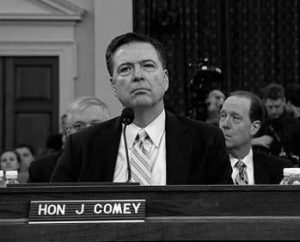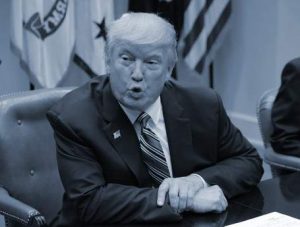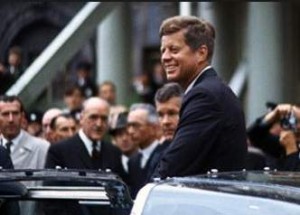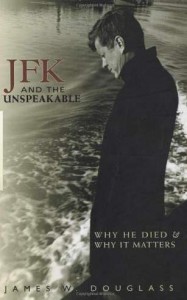Podcast: Play in new window | Download
FBI Director James Comey Termination Fall Out
President Donald Trump’s firing of FBI Director James Comey has many concerned about a possible impending threat to the independence of United States intelligence institutions. Trump’s action represents his most serious violation of political norms to-date. While the president does have the legal authority to fire the FBI director, who serves a 10-year term, it is usually only done under extraordinary circumstances. The administration has said publicly that Comey was fired because he mishandled the investigation into Hillary Clinton’s emails. But that stands in stark contrast with the fact that in January Trump asked Comey to remain in his post. Perhaps more germane is that the dismissal comes less than two months after Comey announced in March that he has been overseeing an investigation into whether the Trump campaign and Trump’s associates coordinated with Russia to influence the 2016 election.
A few days before Comey’s dismissal, Matthew Rosenberg and Matt Apuzzo of the NY Times reported that Comey: “asked the Justice Department for a significant increase in resources for the bureau’s investigation into Russia’s interference in the presidential election.” Trump will now be able to appoint a new FBI director who will run the Russia investigation — an investigation that the president has repeatedly complained about. This has drawn comparisons to Richard Nixon’s efforts to cut off Watergate investigations.
Guest – Attorney Mike German a former FBI agent and a fellow with the Brennan Center for Justice’s Liberty and National Security Program. His work focuses on law enforcement and intelligence oversight and reform. Prior to joining the Brennan Center, Mike served as the policy counsel for national security and privacy for the American Civil Liberties Union Washington Legislative Office. A sixteen-year veteran of federal law enforcement, Mr. German served as a special agent with the Federal Bureau of Investigation, where he specialized in domestic terrorism and covert operations.
—-
JFK and the Unspeakable: Why He Died and Why It Matters by Jim Douglass
JFK and the Unspeakable is the first book of 3 on the assassinations of the 1960s. Orbis Books has commissioned author James W. Douglass to write about the murders of JFK, Malcolm X and Martin Luther King, and his the third will be on the assassination of Bobby Kennedy. The heart of JFK the Unthinkable, is not how Kennedy was killed or how Kennedy became a threat to the systemic war machine, but why DID Kennedy die? Author James Douglass says Kennedy knew that he would die and had the guts to stand up to the system and take the hit. This narrative was lost for decades, obscured by disinformation about Kennedy’s character and the conspiracy of his assassination. One review summarizes Douglass’s book in this way : JFK’s belated effort to turn America from an armed culture of victory to a member of an international peaceful world was shot down in Texas for a reason.
Jim Douglass:
- John F. Kennedy’s experience in WWII: He was in the South Pacific, he volunteered. He was on that PT boat.
- What happened on that PT boat, is that it got split into two by a Japanese destroyer. He lost brothers and friends at that time. An extraordinary experience being adrift on the ocean warning other PT boats. The experience create a distrust in military authority.
- He said that he wanted to splinter the CIA into a thousand pieces and scatter to the winds.
- As Kennedy said to his friends, “they figured me all wrong.”
- The Unspeakable: the kind of evil and deceit that seems to go beyond the capacity of words to describe. The midst of war and nuclear arms race, the assassinations of Kennedy, Martin Luther King and Malcom X that the term was used.
- JFK’s vision is articulated in the address June 10, 1963, arising from the turnaround of the missile crisis and Bay of Pigs. He wanted to move step by step into a disarmed world.
- Nikita Khrushchev put that speech all over the Soviet Union. The Cuban Missile Crisis is a deeply misunderstood part of our history, because it’s usually portrayed as Kennedy going to war with Nikita Khrushchev and beating him.
- The truth was that Kennedy and Nikita Khrushchev were in over their heads, the US generals wanted nuclear war, because they had more warheads than the Soviets.
- Nikita Khrushchev: We now have a common enemy from those pushing us toward war.
- At that point the Cold War turned upside down because Kennedy and Khrushchev became closer to each other than either was toward their own military power system.
- Vietnam: Kennedy’s military people would not give him an exit policy. He signed the withdrawal order from Vietnam before he was assassinated.
- His friends said that he had an obsession with death. It was not an obsession but a real assessment that he was going to die. If you try to turn around a national security state that is dominating the world,
- and you do so as president of the United States, of course you’re going to die. Kennedy knew that.
- The book is a story on the deliberate destruction of hope, the vision of change, a turning of this country all of which was happening and had to be stopped. US Agencies killed Dr. Martin Luther King – 1999 Verdict
- We’re in the same scene right now with Petraeus and McChrystal setting up Obama. They were dictating terms to Obama, unlike Kennedy, he did not face them down.
- We need to get out ahead of Obama so that he can do something.
Guest – James W. Douglass, author and a longtime peace activist and writer. James and his wife Shelley are co-founders of the Ground Zero Center for Nonviolent Action in Poulsbo, Washington, and Mary’s House, a Catholic Worker house of hospitality in Birmingham, Alabama.



